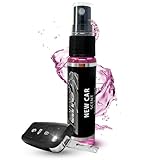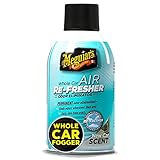Why Does My Car Interior Smell Like Gas?
I love my car—it’s my trusty companion for road trips, errands, and everything in between. But one day, I got in and noticed a strong whiff of gasoline. It wasn’t just a faint smell; it was enough to make me wrinkle my nose and worry. Why does my car interior smell like gas? That question sent me on a mission to figure out what was going on.
I’ve spent time poking around under the hood, talking to mechanics, and learning about fuel systems to get to the bottom of this. If you’re dealing with the same issue, I’m here to share what I’ve discovered, like we’re sitting in my driveway with the windows down. This guide is for anyone in the USA who’s sniffing gas in their car and wants to know why—and how to fix it.

Photo by carx
What Does a Gas Smell in Your Car Mean?
| # | Preview | Product | |
|---|---|---|---|
| 1 |

|
LANE’S Premium Car Air Freshener "New Car" - 1oz Water-Based, Long-Lasting Auto Scent Spray -... | Check Price on Amazon |
When I first smelled gas in my car, I panicked a bit. Is it dangerous? Is my car about to explode? After calming down, I learned that a gasoline odor usually means fuel is escaping somewhere it shouldn’t. Cars are designed to keep fuel sealed in the tank, lines, and engine, so any smell is a sign something’s off.
Gasoline is volatile, meaning it evaporates easily and has a strong scent. Even a tiny leak can make your car smell like a gas station. I found out it’s not always a crisis, but it’s never something to ignore. A gas smell could point to a minor issue, like a loose cap, or something serious, like a cracked fuel line. Knowing this, I wanted to track down the cause in my car.
Why You Shouldn’t Ignore a Gas Smell
I’ll be honest—I was tempted to shrug off the smell at first. It wasn’t that strong, and the car was running fine. But I’m glad I didn’t ignore it. Gasoline vapors are flammable, so a leak near a spark could start a fire. It’s rare, but it happens, and I didn’t want to take the chance.
Breathing gas fumes isn’t great for your health either. I noticed headaches after driving with the smell for a day. Long-term exposure can cause dizziness or worse. Plus, leaks waste fuel, which hits my wallet. Fixing the problem early saves money and keeps me safe. That’s why I decided to investigate right away.
Common Causes of a Gas Smell in Your Car
I found out there are several reasons a car might smell like gas. Each one involves fuel escaping or vapors lingering. Here’s what I learned about the most common culprits.
Loose or Damaged Gas Cap
The gas cap seems simple, but it’s a big deal. It seals the fuel tank to keep vapors in. When I checked my car, the cap was loose—just a half-turn off. A cracked or worn cap can also let fumes escape. I noticed the smell was strongest after filling up, a clue it was cap-related.
Leaking Fuel Lines
Fuel lines carry gas from the tank to the engine. They’re under pressure, so even a tiny crack can leak fuel. I crawled under my car and saw a wet spot on a line near the rear wheel. The smell was stronger there too. Old rubber hoses or loose fittings can also leak.
Faulty Fuel Injectors
Fuel injectors spray gas into the engine for combustion. If they’re worn or stuck, they can leak fuel into the engine bay. I smelled gas under the hood when my injector seals failed. The engine ran rough too, which tipped me off.
Evaporative Emission Control (EVAP) System Issues
The EVAP system traps gas vapors and sends them to the engine to burn. A bad canister, purge valve, or hose can let vapors escape. I had a clogged EVAP canister once, and the smell came through the vents. It’s a common issue in older cars.
Fuel Tank Leaks
A rusted or damaged fuel tank can leak gas. I saw this in my friend’s old truck—pinholes in the tank left puddles under the car. The smell was strong near the rear. This is rare in newer cars but worth checking in older ones.
Overfilling the Gas Tank
I’ve been guilty of topping off the tank after the pump clicks. This can flood the EVAP system, letting vapors escape. The smell usually fades after a day, but it taught me to stop at the first click.
Spilled Gasoline
Sometimes, the smell isn’t a leak. I spilled gas on my shoes once while filling up, then tracked it into the car. The carpet soaked it up, and the smell lingered for days. A gas can in the trunk can also leak and cause odors.
Here’s a table summarizing the causes and clues:
| Cause | Where Smell Is Strongest | Other Signs |
|---|---|---|
| Loose/Damaged Gas Cap | Near gas tank, after fill-up | Check engine light, hissing when opened |
| Leaking Fuel Lines | Under car, near lines | Wet spots, fuel puddles, poor mileage |
| Faulty Fuel Injectors | Engine bay | Rough idle, misfires, check engine light |
| EVAP System Issues | Vents, under car | Check engine light, hissing sounds |
| Fuel Tank Leaks | Rear of car | Puddles under car, low fuel level |
| Overfilling Tank | After fill-up | Fades quickly, no other signs |
| Spilled Gasoline | Carpet, trunk | Visible spill, smell on clothes/shoes |
How I Diagnosed the Gas Smell in My Car
Finding the cause took some detective work. I didn’t want to guess and waste money on wrong fixes. Here’s how I tracked it down.
First, I checked the gas cap. I tightened it until it clicked and drove for a day. The smell was still there, so I moved on. I looked at the cap’s seal—it was cracked, so I replaced it for $10. That helped a bit, but the odor lingered.
Next, I popped the hood and sniffed around the engine. The smell wasn’t strong there, so I ruled out injectors for now. I crawled under the car with a flashlight, looking for wet spots or drips. Sure enough, I found a damp fuel line near the tank. It was a small crack, but enough to leak vapors.
I also checked the carpet and trunk for spills. Nothing there. To be thorough, I scanned for check engine codes with my $30 OBD2 reader. It showed an EVAP code, hinting at a canister issue. Between the fuel line and EVAP, I had my suspects.
Steps to Safely Check for Gas Leaks
Poking around for gas leaks can be risky, so I took precautions. Here’s how I stayed safe while diagnosing.
I parked in a well-ventilated area, outside my garage. Gasoline vapors are heavier than air and can ignite easily. I turned off the engine and let it cool—no hot parts near fuel.
I avoided sparks. I didn’t smoke or use power tools near the car. I wore gloves to keep gas off my skin. If I saw a big leak, I planned to stop and call a mechanic.
I used my nose to guide me. The smell was strongest near the rear, so I focused there. I looked for wet spots, cracks, or loose fittings. A flashlight helped me see under the car.
If you’re not comfortable, don’t do this yourself. I almost skipped the under-car check because it felt risky. A mechanic can inspect safely with a lift.
Fixing the Gas Smell in My Car
Once I found the causes—a cracked fuel line and EVAP issue—I needed to fix them. Here’s how I tackled each.
Replacing the Gas Cap
This was easy. I bought a new cap for $10 at an auto parts store. I made sure it matched my car’s make and model. After screwing it on tightly, I cleared the check engine code. The smell reduced but didn’t vanish.
Repairing the Fuel Line
The cracked fuel line was trickier. I took it to a mechanic because it needed precision. They replaced a 2-foot section of line for $150. I could’ve done it myself for $50 in parts, but I didn’t trust my skills with fuel under pressure. The smell was much weaker after this.
Addressing the EVAP System
The EVAP code pointed to a bad purge valve. I replaced it myself for $40. It’s a small part near the engine, easy to swap with a screwdriver. I watched a YouTube video for my car model to get it right. After clearing the code, the vent smell was gone.
Cleaning Spills
Since I ruled out spills, I skipped this. But if you have one, blot the area with paper towels, then clean with dish soap and water. I’d sprinkle baking soda to absorb odors and vacuum it later.
Preventing Gas Smells in the Future
I didn’t want this problem again, so I started some habits to keep fuel where it belongs. Here’s what I do now.
Check the Gas Cap Regularly
I tighten the cap every fill-up and inspect it yearly. If the seal looks worn, I replace it. It’s a $10 fix that prevents big issues.
Inspect Fuel System
I look under the car every oil change for wet spots or cracks. I also check hoses in the engine bay. Catching leaks early saves money.
Avoid Overfilling
I stop pumping gas at the first click. Topping off isn’t worth the risk of EVAP issues or spills.
Maintain the EVAP System
I have my mechanic check the EVAP system during annual inspections. Replacing a $40 valve is cheaper than fixing a $200 canister later.
Keep the Interior Clean
I vacuum and wipe down my car monthly. This helps me spot spills or leaks early. A clean car also feels better to drive.
When to Call a Professional
I fixed some issues myself, but others needed a pro. Here’s when I’d get help.
Major Leaks
If I saw fuel puddles or a strong smell under the car, I’d call a mechanic. Fuel lines or tanks are dangerous to fix without a lift. Repairs cost $100-$1,000, depending on the issue.
Complex EVAP Problems
A bad canister or multiple EVAP faults need special tools to diagnose. A shop charges $200-$500 but gets it right.
Engine Bay Issues
Leaking injectors or fuel rails are tricky. I’d pay $300-$800 for a pro to handle them safely.
Persistent Smell
If the smell doesn’t go away after simple fixes, a mechanic can pressure-test the fuel system. It’s $50-$150 but finds hidden leaks.
Safety Tips for Dealing with Gas Smells
Gasoline is no joke, so I follow these rules to stay safe.
Ventilate the Car
I drive with windows down to clear fumes. I park outside, not in a garage, until the smell’s gone.
Avoid Sparks
I don’t start the car if the smell is strong. Sparks from the starter could ignite vapors. I also avoid tools that spark.
Don’t Drive Long
I limit driving until the issue’s fixed. Fumes can make me dizzy, and leaks could worsen. I drove only to the shop when my line leaked.
Have a Fire Extinguisher
I keep a small extinguisher in my trunk. It’s $20 and gives me peace of mind for fuel or electrical fires.
Health Risks of Gas Fumes
I didn’t realize how bad gas fumes could be until I felt woozy after a drive. Short-term exposure causes headaches, nausea, or dizziness. I got a headache after 20 minutes in my smelly car.
Long-term exposure is worse—irritated lungs, fatigue, or even nerve damage. Kids and pets are more sensitive. I opened windows and fixed the leak fast to protect my dog, who rides with me. If you feel sick, get fresh air and see a doctor.
Costs of Fixing a Gas Smell
Fixing my car’s gas smell wasn’t cheap, but it was worth it. Here’s what I spent:
- Gas cap: $10
- Purge valve: $40
- Fuel line repair (shop): $150
- OBD2 scanner (one-time): $30
- Professional diagnosis (if needed): $50-$150
- Major repairs (e.g., fuel tank): $500-$1,500
My total was $200, but costs vary by car and issue. DIY saves money, but safety comes first.
Why I’m Glad I Fixed the Gas Smell
Dealing with a gas smell was stressful, but fixing it made me love my car again. I drive without worrying about fires or feeling sick. It’s like my car got a fresh start. Plus, I learned a ton about fuel systems, which makes me a smarter car owner.
Conclusion: Clear the Air in Your Car
Finding out why my car interior smelled like gas was a wake-up call. From a loose gas cap to a cracked fuel line, each cause taught me to pay attention to my car’s health. Fixing the smell wasn’t just about comfort—it was about safety, health, and peace of mind. I love sliding into my car now, knowing it’s free of fumes and ready for the road.
If you’re smelling gas in your car, don’t wait. Check the simple stuff, like the cap, and get help for bigger issues. You’ll save money and drive safer. I hope my story helps you track down that smell and get back to enjoying your ride. Let’s clear the air and hit the road—fume-free!
FAQs
Is it safe to drive if my car smells like gas?
It’s risky. Gas fumes are flammable and can make you sick. I drive only to a shop with windows down and fix it fast.
How do I know if it’s the gas cap causing the smell?
Check if it’s loose or cracked. The smell is strongest after fill-ups, and you might see a check engine light. I fixed mine with a $10 cap.
Can a gas smell come from a spill?
Yes. I spilled gas on my shoes once, and the carpet smelled for days. Clean spills with soap and baking soda to remove the odor.
How much does it cost to fix a fuel line leak?
My mechanic charged $150 for a small section. Major leaks or tank repairs can cost $500-$1,500. It depends on the car.
What should I do if I can’t find the gas smell’s cause?
Take it to a mechanic. They can pressure-test the fuel system for $50-$150. I did this when my EVAP issue was hard to spot.

David Peterson, the chief editor of sparepartscare. I am an automobile engineer and assign to an local firm with much experience in automobile equipment. During the time, most of my experience is related to the Industry of cars parts. I learned about the thing, when working with experienced inspectors, one must be as good as the inspector, or better, with knowledge of the project as well as the practical aspects of automobile industry.











